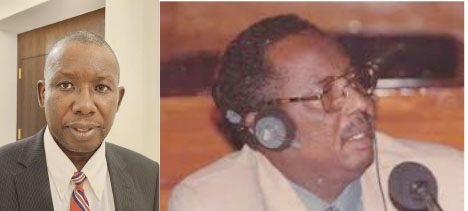Within a year, he found himself at the NIA, beaten, arm-broken, face cut with military bayonet, asked to dig his own grave – all within 22 days of detention. His life was never the same again after this. He is still traumatized, body scarred, experiences nightmares and goes in and out of hospitals because of it. It is perhaps a worse of all the press freedom violations against journalists under Jammeh.
Musa Saidykhan (normally, witnesses are not supposed to be identified in international court trials like this but he gave explicit permission to name him), was a mid-career journalist in The Gambia. He got arrested following the March 2016 military coup against Yahya Jammeh, allegedly foiled by security men loyal to the former dictator, including a then army commander Langtombong Tamba, who’d be subsequently promoted to become Army Chief of Staff after this.
Mr Saidykhan was picked up at 4am from his home in Faji Kunda, Kanifing Municipality, while he was asleep in his night dress. A group of Kalashinkov-armed paramilitary officers of the Gambia Police Force arrived in a vehicle and took him away without telling him why, or telling his family where he was being taken to. It was within days of the “foiled military coup” and a widespread arrest of civilians, politicians, businessmen, students, security and military personnel were conducted. Would this be the end of his life? Was he being sent to prison? Or, whatever thoughts went through Saidykhan’s mind, and those of his family members that early morning, would remain mystery for the three weeks to follow. He was handed to the NIA on their journey to Banjul.
His cellmate would be a nephew of Ndure Cham named Alieu Lowe. The cell was small for the two, it was unwelcoming as the fellow was already lying on a bare concrete floor with blood all over his body and clothes. Saidykhan’s level of fear and nervousness surged through his head as he entered. It was a cold night and the facility was next to the ocean. Mosquitoes breed in dark and moist enclosures and this was just that. In the next cell was mother to nephew, Mustapha Lowe. One’s crime was to host Ndure Cham in his house while fleeing, and the other helped transport him around during the chase. They were both young and school going.
He was kept for a week without a shower. At some point, because the NIA got full with women, children and older detainees, Mr Saidykhan was transferred to the Police headquarters in Banjul. All this while, he was never told what his crime was until his turn came to be tortured. That night he had his first shower and was feeling better when it all started.
“Your journalists are trouble makers and we will teach you a lesson you will never forget,” was all he was told.
However, Saidykhan had earlier travelled to South Africa to participate in the Africa Editors Forum hosted there and presided over by President Thabo Mbeki. He was also an executive member of the Gambia Press Union and when it was his time to speak at that forum, made a strong case for The Gambia’s struggle for democracy against a dictator who took the country hostage, silencing all dissenting voices and neutralising any supposed threats – military or civilian. Furthermore, he told the Forum that a founder of The Gambia’s Press Union and editor of a leading private newspaper, Deyda Hydara, was gunned down about 50 meters from a Police barracks and nothing was done about it – not even a single arrest.
Hydara was also a member of the Africa Editors Forum and Saidykhan told President Mbeki that the Gambian population deserved the support of South Africa just like The Gambia under Jawara gave support against apartheid. Mbeki had pledged to engage Jammeh on these matters. It was a well applauded speech in Johannesburg but back home, Gambian authorities did not receive this well. 2006 was the year Jammeh was supposed to host the African Union summit and he didn’t want anything to interfere with this. “Trouble-makers” like journalists would not spoil the chance, especially after huge investments were made in infrastructure, security and other logistics.
Upon his return to Banjul, Saidykhan was called for questioning by the NIA but got released. It was a bad timing to do anything against him. But March 2006 gave the authorities an opportune moment to “deal with” Musa Saidykhan.
“Ski-masked men came for us. I was dragged out of my cell on the floor. They all began beating me up all over my body at the same time. I was electrocuted all over my body until I fell unconscious. When I opened my eyes later, I could hear one of them say I was not dead, and not to kill me. Rather, to teach me a lesson,” he told the court in Bellinzona on Thursday last week.
He was also told: “You are the problem because your writing goes beyond The Gambia. You’re aggressive in writing and in speech. But when we finish with you, you won’t become a journalist anymore.”
Because they said the President was angry with him for his speech in South Africa, a military bayonet was used to cut his mouth towards the ear while he screamed for God’s help. One of the torturers caught his arm and broke it in two different places. He was in so much pain that he thought he would die. He was left unattended in the cell for days until an alert issued by New York based Committee to Protect Journalists (CPJ) led to his release.
Saidykhan’s testimony will continue today, Monday.
Source link : https://thepoint.gm/africa/gambia/headlines/swiss-court-hears-worse-case-press-violation
Author :
Publish date : 2024-01-22 08:00:00
Copyright for syndicated content belongs to the linked Source.
